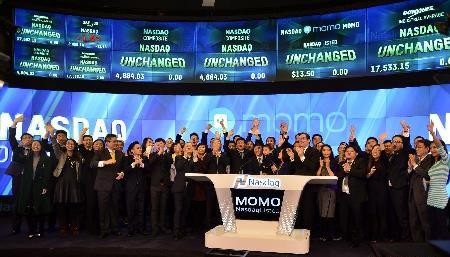The decision of Qihoo 360 Technology, Chinese security software and Web search firm, and Momo, mobile social networking platform backed by Alibaba, to go private will be put to test as the Chinese stock exchanges crashed following big run-ups which many analysts called a bubble.
According to the report, many Chinese firms are planning to delist from the U.S. stock market and go private, with the aim to go public in China despite the crash which observers see as a continuing trend.
"Most privatization deal terms will be unchanged by the short-term volatility of China's domestic stock market," Rosenblatt Securities analyst Jun Zhang wrote in a research note this week.
According to research group Dealogic, 19 Chinese-owned companies listed and trading in the U.S. stock market have expressed plans to go private in the first half of the year.
A major move to go private came on June 17, when Qihoo 360 Technology announced plans to go private, followed by Qihoo CEO Zhou Hongyi's offer for a $10-billion buyout that would pay $77 per American depositary share (ADS).
After that, Qihoo's U.S. stock fell and dropped 5.2 percent July 8, Wednesday, to 55.59. Since June 17, it had been down 23.5 percent, with a market cap near $6.8 billion.
Momo, a mobile social networking platform backed by Alibaba, is also planning to go private, with a $2.6-billion offer in June from a group that includes some of its top executives.
Momo stock fell 2 percent on July 8, Wednesday, and has been down 31 percent since May 27.
Zhang, however, said that despite the crash of the Chinese stock market, U.S.-listed China firms will likely still find that their valuations back in China will be "five to 10 times" greater that what they took on Wall Street.
The report said that some companies remain wary of the crash and a few were having second thoughts about going private.
"Some of the companies I talk to, their management believes that the risk is too high at this moment and they don't want to go private," Henry Guo, an analyst with W.R. Hambrecht/Summit Research, told IBD.
Guo said that the recent sell-off in the Chinese markets has made the "valuation gap between China and the U.S. smaller and smaller," as the recent decline in the shares of Chinese companies planning to delist from the U.S. has shown that investors fear that the companies are likely to change their mind.
Guo added that the process to re-enter the public market after delisting in the U.S. and head back to China to operate typically takes two years.
Other China-based companies that have recently announced plans to go private include data center hosting business 21 Vianet, social networking platform Renren, JA Solar, and China Mobile Games & Entertainment.
Other firms with similar go-private plans include ad firm AirMedia, video surveillance business Vimicro, and cloud service provider China Information.
Credit Suisse analyst Dick Wei said in a June 10 research report that the Chinese government's easing of some listing rules has played a part in the current wave of firms going private and returning to China.
Wei added that these regulatory changes might change, which include bringing potential subsidies and tax benefits to companies that rejoin the Chinese market, where they would become A-share firms.


